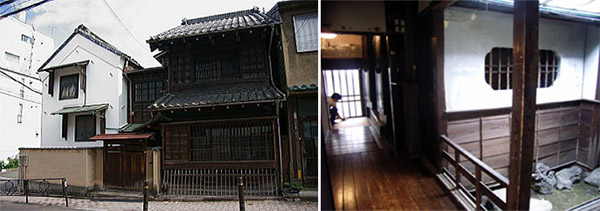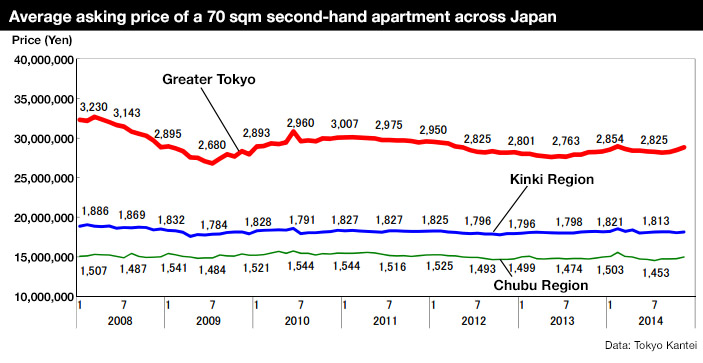150+ year old warehouse and shop in Bunkyo-ku at risk of demolition

The owner of a historic shop in Bunkyo-ku, Tokyo announced plans to demolish the building and sell the land after having difficulty in maintaining the 150 year old property. Local residents have formed a group to oppose demolition and held a public symposium on December 17th to call for urgent action to protect the property.
The former Iseya Pawnshop, located alongside the Hongo-Kikuzaka slope, operated from 1860 to 1982. The property consists of three buildings including a 2-storey warehouse, shop and a 1-storey tatami room. The traditional warehouse dates from the Bakumatsu era, or the closing days of the Tokugawa shogunate (1850s ~ 1860s) and was relocated from Shikihama in Adachi-ku to its current location in 1887. The tatami room was built in 1890 and the shophouse was built in 1907.
Ichiyo Higuchi, a prominent author of the Meiji period who is featured on the 5,000 Yen banknote, mentioned the store in her writing as she lived in the neighbourhood for several years.Read more
Shoto Governor’s Residence sells for 4.3 billion Yen

The former Tokyo Governor’s Residence in Shibuya’s high-end Shoto neighbourhood has been sold to Sumitomo Realty & Development for 4.368 billion Yen (36 million USD), or approximately 1,968,000 Yen/sqm based on the land size.
The residence was offered for sale by the Tokyo Metropolitan Government via public bidding from December 15 ~ 19. Sumitomo and another major real estate company were the only two bidders. The second bidder had tendered approximately 4 billion Yen for the property.Read more
2020 Olympics Athletes Village Plans Revealed

The Tokyo Metropolitan Government announced the model plan for the 2020 Summer Olympics Athletes’ Village in Harumi, Chuo-ku, Tokyo.
There are plans for 22 residential buildings ranging from 14 ~ 17 stories. After the games, the apartments will be sold off as either rental apartment or condominiums. Two 50-storey high-rise apartment towers will also be built after the games, along with a school and retail facilities. A total of 6,000 apartments will be supplied.Read more
First apartment building to be redeveloped in Saitama

Residents of a 34-year old condominium apartment building in Saitama City have decided to rebuild after an earthquake-resistant diagnosis showed the building was at risk of collapse in a major earthquake.
This will be the very first case of a resident-led condominium redevelopment in Saitama Prefecture. To date, Saitama only has two cases of apartment redevelopments - both were carried out for urban development and road widening, rather than building age.
The 7-storey building in Omiya-ku was built in 1980. The average age of a resident is over 60, yet the building was lacking in barrier-free facilities. Equipment was ageing and the elevator needed replacing. In 2009, a building inspection found that the structure was not earthquake-proof and posed a danger of collapse in a major earthquake.
Secondhand apartment prices in November 2014 - Tokyo Kantei

According to Tokyo Kantei, the average asking price of a 70 sqm (753 sqft) second-hand apartment in Tokyo’s 23 wards was 43,300,000 Yen in November, up 1.7% from the previous month and up 6.6% from last year. The average building age was 22.3 years.
In central Tokyo’s six wards (Chiyoda, Chuo, Minato, Shinjuku, Bunkyo and Shibuya), the average apartment asking price was 61,280,000 Yen, up 1.8% from the previous month and up 12.0% from last year. The rate of increase has been expanding since August 2014. The average building age was 21.6 years.Read more
1960s Osaka office conversion wins renovation prize

The conversion of a 48-year old small office building into a private residence won best design (open category) in the 2014 Renovation of the Year awards announced on November 2.
The 4-storey office building had a floor plate of 66 sqm and was surrounding by buildings on three sides, limiting natural light. The property was purchased for a relatively low cost due to its age and the difficulty in attracting commercial tenants.Read more
New apartment prices in Tokyo up 10.3%
According to the Real Estate Economic Institute, 3,337 brand new apartments were released for sale in greater Tokyo in November, up 6.8% from the previous month but down 33.3% from last year. This is the 10th month in a row to see a year-on-year decline. It is also lower than the Institute’s forecast of 4,000 apartments. This is the lowest level for November since 2008 and is thought to be due to developers postponing sales in major projects until the new year.
2,617 apartments were sold, making the contract rate 78.4%, up 15.1 points from the previous month but down 1.2 points from last year.
The average new apartment price was 52,240,000 Yen, up 14.6% from the previous month and up 5.2% from last year. The average price per square meter was 737,000 Yen, up 15.5% from the previous month and up 6.2% from last year.Read more
